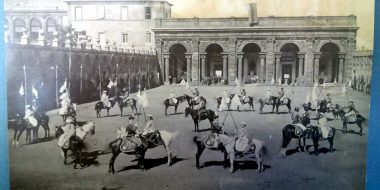The boarding school does not live by study alone

Boarding school often conjures up a stern image of restrictions, rules and the occasional punishment, yet life and above all the memories of the former boarders of the Jesuit schools, who still meet annually, are very different.
The papers preserved in our historical archive allow us to get a close look at the school subjects studied by the boarders and also reveal all the numerous extra-school activities – which kept them busy. Let us therefore see some of them and imagine how full and intense the boarder’s day could have been, using the documentation preserved in the fonds of the Nobile Collegio Mondragone.
From the desks to the stage: acting
In addition to lessons in Latin, Greek, philosophy, mathematics and all the subjects on the syllabus, the main activity accompanying the lessons was theatre, an instrument historically used by the Company for education and didactics.Acting was in fact considered an integral part of boarding school education and is amply documented in the archives: photographs, invitations to end-of-year performances, staged texts, playbills.Theatre, however, was only one of the many disciplines in which boarders engaged.

From music to horsemanship, there is also room for rebuses.
The boarding school students studied music, piano but also wind and percussion instruments, and formed veritable orchestras; they played tennis, performed fencing and, at least in the 19th century, practised as cavalrymen. The colleges were in fact intended – at least in the initial phase of their activity – for the education of the nobility, as their titles indicate – Noble College of Mondragone, College of the Nobles of Tivoli, College of the Nobles of – so disciplines and activities akin to the training of aristocrats were contemplated. The boarding school could then dabble in chess and all the puzzles reported in the school magazines: charades, rebuses, riddles, as well as the popular serialized stories.
Sport
Sport, too, characterised the boys’ education; Mondragone, surrounded by parkland, offered a suitable space for physical exercise, football was played in an area which today contains hedges right in front of a decorated portico; school newspapers always report on matches and exciting sporting challenges, as well as athletics and sack races which were always dear to the boys and practised until the school closed. In the course of time, some of these activities were no longer practised, the schools adapted to the times, but the races of the Gonzaga boys of Palermo on the football fields, or those of the boarding schools of Birkirkara, Milan, Naples and Turin are not so different from those of the boys of Mondragone or Tivoli, whose memory and recollection remains in the papers in our archive.
Maria Macchi











